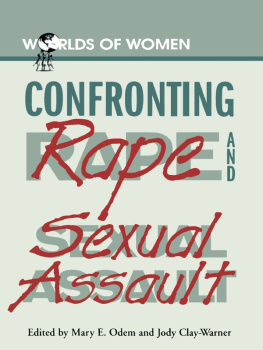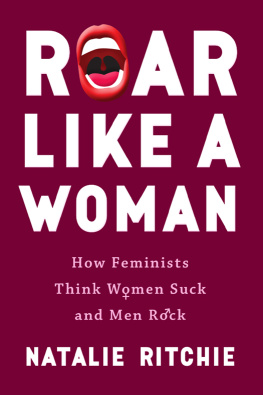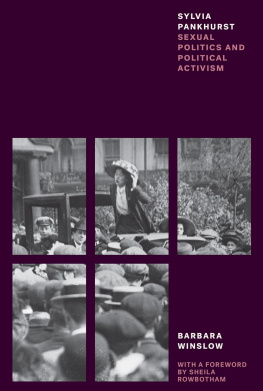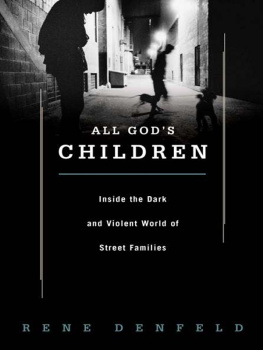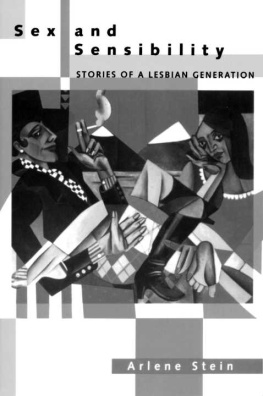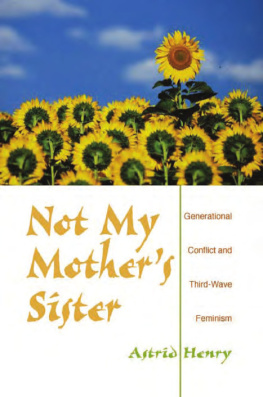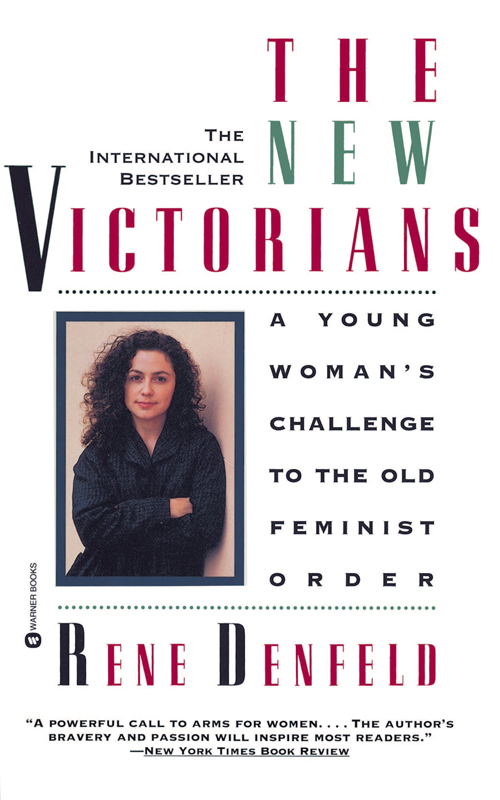All rights reserved.
Visit our website at www.HachetteBookGroup.com.
CHEERS FOR RENE DENFELD AND
THE NEW VICTORIANS
Rene Denfeld is one bold writer: twenty-eight years old, fueled by good sense and righteous anger . Lets hope she stays on the front lines.
New York Times Book Review
A recording of the zeitgeist among younger women . The gloves are off in the battle for the future of feminism . Denfeld is obviously right that something is going awry.
Kate Muir, The Times (London)
Delightful and thoroughly persuasive, Rene Denfelds feminism is individualistic, clear-headed, and irreverent . She makes an overwhelming case, all the while pointing the way back to sanity and dignity.
Christina Hoff Sommers, author of Who Stole Feminism?
Commendable work her arguments are definitely valid.
Buffalo News
Pardon the saying, but Rene Denfeld has balls. About 300 pages of them . Denfeld does not only write well and define her theories clearly, she takes risks with description and humor that were previously lacking in most feminist writing.
The Review, University of Delaware
A wonder.
Book Page
Provocative Denfeld goes Katie Roiphe one better.
Entertainment Weekly
Rene Denfeld has her boxing gloves on, both literally and figuratively. Literally in the sense that she is one of a sprinkling of female amateur boxers in the United States. And figuratively, in that the twenty-eight-year-old Portland resident withholds no punches in her attack on the godheads of the feminist movement.
Journal Gazette (IN)
She articulates her generations dilemma . She also alerts readers to some highly questionable alliances, including that between anti-pornography feminists and the Religious Right.
Sunday Oregonian
Since the late 1960s, millions of women have slowly discarded the personal and social girdles squeezing life options to a cramped few. Yet the National Organization for Women, in the forefront of most advances, has never achieved mainstream status . Rene Denfeld tells why.
Milwaukee Sentinel
Valuable Denfeld doesnt weave her argument from thin air . It [will] certainly provoke discussion.
News & Record (NC)
A rallying cry for women to take back feminism.
Sun-Bulletin (NJ)
A scathing and clear-eyed depiction of the hijacking of a movement.
Swing
Excellent points.
Charleston Post and Courier (SC)
A sort of high-speed still photo of the terminating explosion of Second Wave feminism, the variety that began in the late 1960s. Some of the fragments are still large and hot, but their point of origin has pretty clearly ceased to exist.
Culture Wars
First, let me give my heartfelt thanks to all the young women, too numerous to name here, who were willing to talk to me openly and honestly about their feelings regarding feminism. I would especially like to thank Caryn Brooks, Julie Shaw, Samantha Levine, Anne Greenwood, Jim Scoville, Lauren Gwin, and Jenn Stout for sharing their friends with me. Susan Stanley generously shared writing know-how, and Bill Donahue provided fine research assistance.
Richard Pine is the agent writers dream about. His assistant Lori Andiman offered strong advice and, on one memorable evening, strong drinks. My editor Jamie Raab was always available and immeasurably supportive.
Katherine Dunn helped me constantly along the wayfrom concept to proposal to finish. Without her this book wouldnt have happened. She has been an invaluable friend.
My deep thanks to Bill Redden, who spent tireless hours reading proofs, debating points and making suggestions.
Finally, I want to thank my family for their support, and my mother, for teaching me what feminism means.
This book is dedicated to my sister, Nichole Appleton, in the hope that there will be a womens movement for her in the future.
I was born a year after the National Organization for Women was created in 1966, and I was a small child while many of the battles for womens rights were being fought. Like most women of my generation, I can not remember the time when abortion was illegal. I can not remember a timethough my mother tells me it is truewhen women were expected to go to college to snag a husband, not to earn a degree, when working women were confined to pink-collar jobs such as waitressing, when reliable birth control was unavailable, and when women were kept ignorant about their bodies and their sexuality. It was a time that translated into simple and devastating scenarios: a young woman denied birth control and dying from a back-alley abortion, a woman graduating from college, only to find the path of higher learning led directly to the typing pool, a ten-year-old schoolgirl wishing she could take shop class with the boys, only to be herded into home ec to make Jell-O and practice silverware arrangements. It was a time when, it is difficult to believe, sexism was not considered a problem or even recognized as a word in the public vocabulary.
We have it much better now than our mothers ever did. Abortion was legalized in 1973. There was the long fight to pass the ERA, which may have failed but which firmly planted the notion of equal rights in the public mind. There was the creation of NOW and the Womens Equity Action League in the 1960s, and the battles they won against sex discrimination in the workplace and schools. There was the womens health movement, the publication of Our Bodies, Ourselves, the introduction of rape shield laws (which limit admissibility of a victims sexual history), the founding of battered womens shelters, and the emergence of women in business, law, and politics. There were Betty Friedan, Gloria Steinem, Bella Abzug, Germaine Greer, Kate Millet, and many others. It was the second wave of feminism, and its impact on womens futures was profound.
For women of my generation, feminism is our birthright. While sexism may still permeate society, we know what it is to live without excessive confinement. We are the first generation to grow up expecting equal opportunity and equal education, as well as the freedom to express our sexuality. We are the first to assume what feminists had to force society to accept against its deeply ingrained prejudice: that we are the equals of any man. This belief may translate into the pursuit of a career or it may mean demanding respect for raising childrenwomen of my generation believe in the right to choose.
Given, then, this huge debt we owe feminism, why do so many women my age refuse to join the womens movement? Why do we adamantly reject the feminist label?
While numerous polls show that American women of all ages overwhelmingly support feminist ideals, these polls also show that they largely avoid calling themselves feminists and in many ways have abandoned the movementeven though most feel there is still work to be done. A 1989 Time/CNN survey reported that a majority of women believed feminism had advanced womens rights but that only 33 percent considered themselves feminists. A whopping 76 percent polled said they paid little or no attention to the womens movement.




